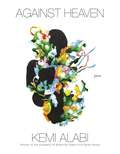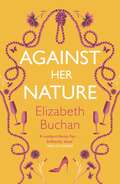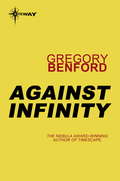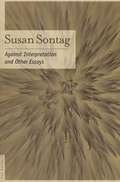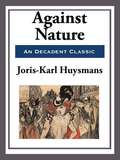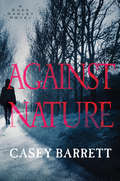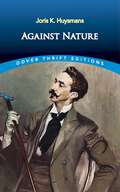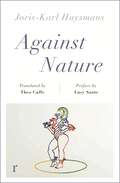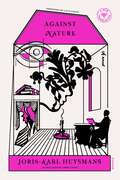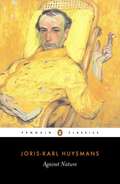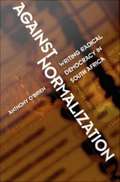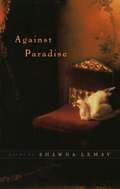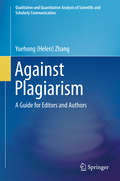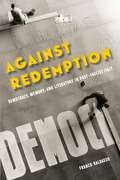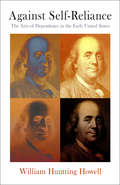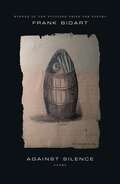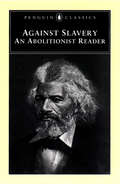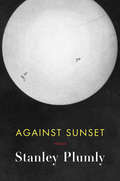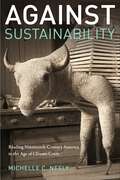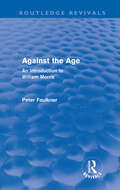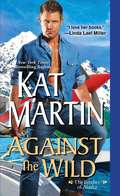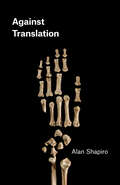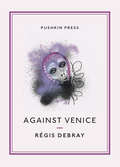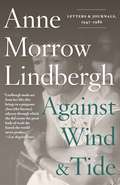- Table View
- List View
Against Heaven: Poems
by Kemi AlabiWinner of the Academy of American Poets First Book Award, selected by Claudia Rankine. Kemi Alabi’s transcendent debut reimagines the poetic and cultural traditions from which it is born, troubling the waters of some of our country’s central and ordained fictions—those mythic politics of respectability, resilience, and redemption. Instead of turning to a salvation that has been forced upon them, Alabi turns to the body and the earth as sites of paradise defined by the pleasure and possibility of Black, queer fugitivity. Through tender love poems, righteous prayers, and vital provocations, we see the colonizers we carry within ourselves being laid to rest.Against Heaven is a praise song made for the flames of a burning empire—a freedom dream that shapeshifts into boundless multiplicities for the wounds made in the name of White supremacy and its gods. Alabi has written an astonishing collection of magnificent range, commanding the full spectrum of the Black, queer spirit’s capacity for magic, love, and ferocity in service of healing—the highest power there is.
Against Her Nature: 'a Modern Day Vanity Fair' Mail On Sunday
by Elizabeth BuchanA modern-day take on Vanity Fair, from bestselling novelistElizabeth Buchan. Love, money and children... Life is a risk, however much we try to protect ourselves... Unlike the Frants living their quiet ordered lives in the village of Appleford, Tess and Becky are of the generation that believes it can have everything. Highflyers in the high-octane world of London's high-finance, they move through the opportunists, the short-termists, the sharks, the bullies and the very, very rich to face many choices, not least the one presented by biology: children. As the different generations balance the challenges life throws at them, a tender and unexpected love story emerges alongside a journey to maturity in this bold and beautiful novel.
Against Hope
by Victor SantosIt has been years since an insane family of neo-Nazi's murdered her boyfriend and almost killed Hope -- now she is tracking them down and exacting her bloody revenge.Raised by a martial arts master, Hope grew from an angry and grieving teenage girl into a cold-hearted bounty hunter. When she discovers the family who brutalized her is now running for public office and controlling a cabal of violent white nationalists from the shadows, Hope gears up and hits the road with the intent to slaughter every single Nazi that gets in her way. Victor Santos (Polar - now a hit Netflix movie) writes and draws a new story with brutal fight scenes and impactful revelations that echo across decades of the main character's life.
Against Infinity: Jupiter Project Book 2
by Gregory BenfordOn the poisonous, icy surface of Ganymede, a man and a boy are on a deadly hunt. Their prey is the Aleph - an unknowable alien artifact that roamed and ruled Ganymede for countless millennia. Indescribable, infinitely dangerous, the Aleph haunts men's dreams and destroys all efforts to terraform Ganymede into a habitable planet. Now in a modern world ancient struggle is joined, as a boy seeks manhood, a man seeks enlightenment, and a society seeks the power to rule the universe.
Against Interpretation and Other Essays
by Susan SontagFirst published in 1966, this celebrated book--Sontag's first collection of essays--quickly became a modern classic, and has had an enormous influence in America and abroad on thinking about the arts and contemporary culture.
Against Nature
by Joris-Karl HuysmansAgainst Nature by Joris-Karl Huysmans is a novel in which very little happens; its narrative concentrates almost entirely on its principal character, and is mostly a catalogue of the tastes and inner life of Jean Des Esseintes, an eccentric, reclusive aesthete and antihero, who loathes 19th century bourgeois society and tries to retreat into an ideal artistic world of his own creation. Against Nature contains many themes which became associated with the Symbolist aesthetic. In doing so, it broke from naturalism and became the ultimate example of decadent literature. Jean Des Esseintes is the last member of a powerful and once proud noble family. He has lived an extremely decadent life in Paris which has left him disgusted with human society. Without telling anyone, he absconds to a house in the countryside. He fills the house with his eclectic art collection and decides to spend the rest of his life in intellectual and aesthetic contemplation. Throughout his intellectual experiments, he recalls various debauched events and love affairs of his past in Paris.
Against Nature (A Duck Darley Novel #2)
by Casey BarrettPerched in an airy penthouse above the corrupt streets of Manhattan, unlicensed P.I. Duck Darley has settled into an unlikely domestic routine with a wealthy divorcée and her precocious eight-year-old son. But old nightmares return when a desperate text from Cass Kimball, the former partner Duck once took a bullet to protect, lures him back into sworn-off vices and the sinister world of professional sports . . . Cass cries murder after her boyfriend tumbles to his death in the Catskills while researching the tragic doping experiments that changed the lives of East German Olympic athletes during the Cold War. Following the brutal killing of a champion javelin thrower, Cass herself is arrested on charges of double homicide, leaving Duck on an impossible quest for answers while doubting everything he ever believed about his secretive sidekick . . . Now, caught between the secret horrors of extreme performance enhancement and shadowy criminals who stalk him relentlessly, it’s sink or swim as Duck stumbles through a reckless investigation that endangers both his life and that of anyone he allows himself to hold dear.
Against Nature (Dover Thrift Editions)
by Joris K. HuysmansA classic account of the quest for enlarged experience and new sensations, this 1884 novel scandalized Victorian critics with its break from naturalism and embrace of fin-de-siècle decadence.
Against Nature (riverrun editions): a new translation of the compulsively readable cult classic
by Joris-Karl HuysmansThe cult novel of fin de siècle decadence that inspired Oscar Wilde'It will be biggest fiasco of the year - but I don't give a damn! It will be something nobody has ever done before.' The title page of the first complete English translation of Against Nature (published in the French as À Rebours) included the caption 'the book that Dorian Gray loved and inspired Oscar Wilde.' It was, declared Wilde, one of the best novels he had ever read. It is the story of Jean des Esseintes, the last of a proud and noble family, who retreats from the world in disgust at bourgeois society and leads a life based on cultivation of the senses through art. Des Esseintes distills perfumes from the rarest oils and essences, he creates a garden of poisonous flowers, sets gemstones in a tortoise's gold-painted shell and plans to corrupt a street urchin until he is degraded enough to commit murder. Des Esseintes' aesthetic pilgrimage is described in minutely documented realistic detail and was widely regarded as the guidebook of decadence. This influential novel is now available in a new translation by Theo Cuffe and includes a preface by Luc Sante.
Against Nature: A Novel
by Joris-Karl HuysmansJoris-Karl Huysmans’s cult classic of deviance and decadence that inspired Oscar Wilde’s Picture of Dorian Gray, now in a new translation by Theo CuffeA celebration of deviance, vanity, sensual abandon, and the aesthetics of artifice, Against Nature brings us the nineteenth-century rebel Jean Des Esseintes—disaffected, degenerate, and art obsessed. The last of a proud and noble family, Des Esseintes retreats from the world in disgust at bourgeois society and leads a life based on cultivation of the senses through art. He distills perfumes from the rarest oils and essences, creates a garden of poisonous flowers, sets gemstones in a tortoise’s gold-painted shell, and plans to corrupt a street urchin until he is degraded enough to commit murder. Des Esseintes’s groundbreaking aesthetic pilgrimage in Against Nature has served as the guidebook to decadence for more than a century, inspiring writers from Oscar Wilde to Michel Houellebecq.A pioneer whose early work took inspiration from Baudelaire and Zola, Joris-Karl Huysmans was a founder of the nineteenth-century decadent movement. Against Nature has influenced countless writers and artists and enjoys a cult following to this day. This new translation by Theo Cuffe, with a foreword by Lucy Sante, captures the magnificence of Huysmans’s famous style—filled with wit and irony, expressiveness and precision, erudition and sensuality.
Against Nature: A Rebours
by Joris-Karl HuysmansThe hero of this curious novel is des Esseintes, a neurasthenic aristocrat who has turned his back on the vulgarity of modern life and retreated to an isolated country villa. Here, accompanied only by a couple of silent servants, he pursues his obsessions with exotic flowers, rare gems, and complex perfumes and embarks on a series of increasingly strange aesthetic experiments, starting with the decision to give his giant pet tortoise a jewel-encrusted shell...
Against Normalization: Writing Radical Democracy in South Africa
by Anthony O'BrienAt the end of apartheid, under pressure from local and transnational capital and the hegemony of Western-style parliamentary democracy, South Africans felt called upon to normalize their conceptions of economics, politics, and culture in line with these Western models. In Against Normalization, however, Anthony O'Brien examines recent South African literature and theoretical debate which take a different line, resisting this neocolonial outcome, and investigating the role of culture in the formation of a more radically democratic society. O'Brien brings together an unusual array of contemporary South African writing: cultural theory and debate, worker poetry, black and white feminist writing, Black Consciousness drama, the letters of exiled writers, and postapartheid fiction and film. Paying subtle attention to well-known figures like Nadine Gordimer, Bessie Head, and Njabulo Ndebele, but also foregrounding less-studied writers like Ingrid de Kok, Nise Malange, Maishe Maponya, and the Zimbabwean Dambudzo Marechera, he reveals in their work the construction of a political aesthetic more radically democratic than the current normalization of nationalism, ballot-box democracy, and liberal humanism in culture could imagine. Juxtaposing his readings of these writers with the theoretical traditions of postcolonial thinkers about race, gender, and nation like Paul Gilroy, bell hooks, and Gayatri Spivak, and with others such as Samuel Beckett and Vaclav Havel, O'Brien adopts a uniquely comparatist and internationalist approach to understanding South African writing and its relationship to the cultural settlement after apartheid. With its appeal to specialists in South African fiction, poetry, history, and politics, to other Africanists, and to those in the fields of colonial, postcolonial, race, and gender studies, Against Normalization will make a significant intervention in the debates about cultural production in the postcolonial areas of global capitalism.
Against Paradise
by Shawna LemayShawna Lemay’s rich, amused, insistent, ingenious meditation on Venice will surprise readers with its peculiar grace. Here is the work of an elegant raconteur; a self-effacing, sharp-eared occupier of voices; a high-toned, compassionate gossip. From many mouths, she offers us the city, doomed, full of light. Lemay’s Venice is a small, crowded community of the delightfully eccentric dead. Through her quirky dramatic monologues, each one shimmering with a companionable intelligence, we meet them – George Eliot, Peggy Guggenheim, Lord Byron, Mary Shelley, Effie Ruskin, Ernest Hemingway, Titian, various unnamed others; we meet them in mid-speech; it seems they have never stopped talking, talking, telling now (or refusing still to tell) their secrets, protecting their vanities still, finally saying what they truly think. Lemay has given us an entire world, dark, haughty, watery, beautiful, full of voices, sedimented with stories.
Against Plagiarism: A Guide for Editors and Authors (Qualitative and Quantitative Analysis of Scientific and Scholarly Communication)
by Yuehong H. Helen ZhangThis is the first volume of a book series dedicated to "Qualitative and Quantitative Analysis of Scientific and Scholarly Communication". Fighting plagiarism is a the top priority for STM publishing. A practical guide will importantly contribute to the awareness of the relevant communities, bringing to the surface the basic rules and examples from the literature.
Against Redemption: Democracy, Memory, and Literature in Post-Fascist Italy (World War II: The Global, Human, and Ethical Dimension)
by Franco BaldassoWINNER, HELEN AND HOWARD R. MARRARO PRIZE IN ITALIAN HISTORYDiscloses the richness of ideas and sheds light on the controversy that characterized the transition from fascism to democracy, examining authors, works and memories that were subsequently silenced by Cold War politics.How a shared memory of Fascism and its cultural heritage took shape is still today the most disputed question of modern Italy, crossing the boundaries between academic and public discourse. Against Redemption concentrates on the historical period in which disagreement was at its highest: the transition between the downfall of Mussolini in July 1943 and the victory of the Christian Democrats over the Left in the 1948 general elections. By dispelling the silence around the range of opinion in the years before the ideological struggle fossilized into Cold War oppositions, this book points to early postwar literary practices as the main vehicle for intellectual dissent, shedding new light on the role of cultural policies in institutionalizing collective memory. During Italy’s transition to democracy, competing narratives over the recent traumatic past emerged and crystallized, depicting the country’s break with Mussolini’s regime as a political and personal redemption from its politics of exclusion and unrestrained use of violence. Conversely, outstanding authors such as Elsa Morante, Carlo Levi, Alberto Moravia, and Curzio Malaparte, in close dialogue with remarkable but now-neglected figures, stressed the cultural continuity between the new democracy and Fascism, igniting heated debates from opposite political standpoints. Their works addressed questions such as the working through of national defeat, Italian responsibility in World War II, and the Holocaust, revealing how the social, racial, and gender biases that characterized Fascism survived after its demise and haunted the newborn democracy.
Against Self-Reliance
by William Huntting HowellIndividualism is arguably the most vital tenet of American national identity: American cultural heroes tend to be mavericks and nonconformists, and independence is the fulcrum of the American origin story. But in the late eighteenth and early nineteenth centuries, a number of American artists, writers, and educational philosophers cast imitation and emulation as central to the linked projects of imagining the self and consolidating the nation. Tracing continuities between literature, material culture, and pedagogical theory, William Huntting Howell uncovers an America that celebrated the virtues of humility, contingency, and connection to a complex whole over ambition and distinction. Against Self-Reliance revalues and rethinks what it meant to be repetitive, derivative or pointedly generic in the early republic and beyond. Howell draws on such varied sources as Benjamin Franklin's programs for moral reform, Phillis Wheatley's devotional poetry, David Rittenhouse's coins and astronomical machines, Benjamin Rush's psychological and political theory, Susanna Rowson's schoolbooks, and the novels of Charles Brockden Brown and Herman Melville to tease out patterns of dependence in early America. With its incisive critique of America's storied heroic individualism, Against Self-Reliance argues that the arts of dependence were—and are—critical to the project of American independence.
Against Silence: Poems
by Frank BidartAn urgent new collection from the winner of the Pulitzer Prize and the National Book Award and “one of the undisputed master poets of our time” (Craig Morgan Teicher, NPR)Words, voices reek of the worlds from which theyemerge: different worlds, each with its all but palpablearoma, its parameters, limitations, promise.Words—there is a gap, nonetheless alwaysand forever, between words and the world—slip, slide, are imprecise, BLIND, perish. •Set up a situation,—. . . then reveal an abyss.For more than fifty years, Frank Bidart has given voice to the inner self, to the depths of his own psyche and the unforgettable characters that populate his poems. In Against Silence, the Pulitzer Prize winner’s eleventh collection of poetry, Bidart writes of the cycles we cannot escape and the feelings we cannot forget. Our history is not a tabula rasa but a repeating, refining story of love and hate, of words spoken and old cruelties enacted. Moving among the dead and the living, the figures of his life and of his past, Bidart calls reality forth—with nothing settled and nothing forgotten, we must speak.
Against Slavery
by VariousAssembles more than forty speeches, lectures, and essays critical to the abolitionist crusade. Features William Lloyd Garrison, Frederick Douglass, Lydia Maria Child, Wendell Phillips, Harriet Beecher Stowe, and Ralph Waldo Emerson. "An invaluable resource to students, scholars, and general readers alike."—Amazon.com.
Against Sunset: Poems
by Stanley PlumlyA powerful new volume from the National Book Award finalist that demonstrates how the lyric is essentially elegiac. Whether addressing the deaths of friends and other poets or celebrating the closing of the day and the autumn of the seasons, Against Sunset reveals Stanley Plumly at his most personal and intimate. As much an homage to the rich tradition of the Romantics as it is a meditation on memory itself, these poems live at the edges of disappearances. From "Against Sunset" The horizon, halfway disappeared between above and below-- night falls too or does it also rise out of the death-glitter of water? And if night is the long straight path of the full moon pouring down on the face of the deep, what makes us wish we could walk there, like a flat skipped stone?
Against Sustainability: Reading Nineteenth-Century America in the Age of Climate Crisis
by Michelle NeelyAgainst Sustainability responds to the twenty-first-century environmental crisis by unearthing the nineteenth-century U.S. literary, cultural, and scientific contexts that gave rise to sustainability, recycling, and preservation. Through novel pairings of antebellum and contemporary writers including Walt Whitman and Lucille Clifton, George Catlin and Louise Erdrich, and Herman Melville and A. S. Byatt, the book demonstrates that some of our most vaunted strategies to address ecological crisis in fact perpetuate environmental degradation.Yet Michelle C. Neely also reveals that the nineteenth century offers useful and generative environmentalisms, if only we know where and how to find them. Henry David Thoreau and Emily Dickinson experimented with models of joyful, anti-consumerist frugality. Hannah Crafts and Harriet Wilson devised forms of radical pet-keeping that model more just ways of living with others. Ultimately, the book explores forms of utopianism that might more reliably guide mainstream environmental culture toward transformative forms of ecological and social justice. Through new readings of familiar texts, Against Sustainability demonstrates how nineteenth-century U.S. literature can help us rethink our environmental paradigms in order to imagine more just and environmentally sound futures.
Against The Age: An Introduction to William Morris (Routledge Revivals)
by Peter FaulknerStudents new to the work of William Morris will find the full range of his achievements covered in this reissue of Peter Faulkner's excellent biography, first published in 1980. The author has carefully placed Morris in the context of the Victorian age, but has also suggested the relevance of his ideas today. The six chapters are organised biographically and cover all aspects of Morris’s work in poetry, fiction, design and socialist politics. The emphasis is on his continuous struggle against the age in which he lived, seen as an idealism which went through various stages from the wistfulness of The Earthly Paradise through the practical activities of the firm of Morris & Company to the socialism of Morris's later years. The book quotes freely from writings by Morris which are not easily accessible and gives an overall account from which the student can develop his specialist interests. This reissue will appeal to sixth-formers and undergraduates interested in the Victorian period, as seen through one of its most striking personalities. When this book appeared in 1980, Morris’s reputation had risen again after the low estimates of the interwar period. This was due both to the reappraisal of his politics and to the expanding popularity of his designs. Against the Age offers a clear account of Morris’s career for those developing an interest in his numerous achievements. It covers the whole range of Morris’s work, and argues for his significance as a writer of both poetry and prose. Since 1980 our knowledge of Morris has been enriched by the publication of Norman Kelvin’s edition of his Collected Letters, by the late Nicholas Salmond’s editions of his contributions to the socialist journals, by Fiona MacCarthy’s biography of 1984, and by the increasing recognition of Morris as a pioneer of environmentalism. However, the book retains its value for its wide coverage and its balanced attitude to Morris’s achievements, and for its encouragement to readers to consider the issues that make Morris of continuing importance today.
Against The Wild
by Kat MartinAlaska. Where the men are as bold and untamed as America's last wilderness. It's been three years since Lane Bishop tragically lost her fiancé, and she's finally ready to risk her heart on someone else. The hot look in Dylan Brodie's eyes says he's going to be that man. But when Lane flies to the remote 1930's fishing lodge to help him renovate, she discovers a little girl who won't speak, eerie legends and strange sounds in the night. And when she investigates the history of the lodge, she uncovers a legacy of injustice and murder. As danger stalks his daughter and the woman he is coming to love, Dylan must risk everything to uncover the shocking truth. Includes an excerpt from her next book.
Against Translation (Phoenix Poets)
by Alan ShapiroWe often ask ourselves what gets lost in translation—not just between languages, but in the everyday trade-offs between what we experience and what we are able to say about it. But the visionary poems of this collection invite us to consider: what is loss, in translation? Writing at the limits of language—where “the signs loosen, fray, and drift”—Alan Shapiro probes the startling complexity of how we confront absence and the ephemeral, the heartbreak of what once wasn’t yet and now is no longer, of what (like racial prejudice and historical atrocity) is omnipresent and elusive. Through poems that are fine-grained and often quiet, Shapiro tells of subtle bereavements: a young boy is shamed for the first time for looking “girly”; an ailing old man struggles to visit his wife in a nursing home; or a woman dying of cancer watches her friends enjoy themselves in her absence. Throughout, this collection traverses rather than condemns the imperfect language of loss—moving against the current in the direction of the utterly ineffable.
Against Venice
by John Howe Regis DebrayNumerous writers have made declarations of love to cities, but Against Venice speaks not of love, but of dislike. It is a counterblast to intellectuals who regard Venice as the city where existentialism should be experienced, at parties in the palazzi of friends. Debray criticises this world in a refreshingly irreverent way, luring the traveller back to this seductive city.
Against Wind and Tide: Letters and Journals, 1947-1986
by Reeve Lindbergh Anne Morrow LindberghWhy, as an eager and talented writer, has Anne Morrow Lindbergh published so relatively little in forty years of marriage?" asked reviewer John Barkham in 1970. "After a promising start with those first books on flying, she tapered off into long silences broken by an infrequent volume of verse or prose." Many years later, Lindbergh replied with a quote from Harriet Beecher Stowe, who claimed that writing, for a wife and mother, is "rowing against wind and tide." In this sixth and final collection of Lindbergh's diaries and letters, taking us from 1947 to 1986, we mark her progress as she navigated a remarkable life and a remarkable century with enthusiasm and delight, humor and wit, sorrow and bewilderment, but above all devoted to finding the essential truth in life's experiences through a hard-won spirituality and a passion for literature. Between the inevitable squalls of life with her beloved but elusive husband, the aviator Charles A. Lindbergh, she shepherded their five children through whooping cough, horned toads, fiancés, the Vietnam War, and their own personal tragedies. She researched and wrote many books and articles on issues ranging from the condition of Europe after World War II to the meaning of marriage to the launch of Apollo 8. She published one of the most beloved books of inspiration of all time, Gift from the Sea. She left penetrating accounts of meetings with such luminaries as John and Jacqueline Kennedy, Thornton Wilder, Enrico Fermi, Leland and Slim Hayward, and the Frank Lloyd Wrights. And she found time to compose extraordinarily insightful and moving letters of consolation to friends and to others whose losses touched her deeply. More than any previous books by or about Anne Morrow Lindbergh, Against Wind and Tide makes us privy to the demons that plagued this fairy-tale bride, and introduces us to some of the people--men as well as women--who provided solace as she braved the tides of time and aging, war and politics, birth and death. Here is an eloquent and often startling collection of writings from one of the most admired women of our time.
